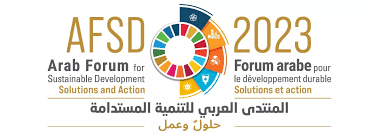The regional coordinator for Housing and Land Rights Network, Joseph Schechla, submitted an oral intervention on (SDG11), during the participation in the Arab Forum for Sustainable development that organized by ESCWA from 14-16 March. HIC-HLRN is participating with Abir Saksouk of Public Works Studio (Lebanon) as discussants on the 2023 Arab Forum for Sustaionable Development panel on "New inclusive and sustainable pathways for cities (SDG11)," to review the impact of COVID-19 and other crises on the efforts of Arab countries to make progress on this 2030 Agenda goal, and the international commitments, national urban policies implemented by municipalities to move toward inclusive urban governance, to leave no one and no place behind.
Speakers on the panel include:
Yusuf al-Shawarbeh, Mayor of Amman, Greater Amman Municipality, Hashemite Kingdom of Jordan
Fatima Amzel, Deputy Mayor of Agadir, Kingdom of Morocco
Kawthar al-Mahdaoui, Deputy Mayor of Sousse, Republic of Tunisia
Muhammad Khashashneh, Secretary General, Ministry of Environment, Hashemite Kingdom of Jordan
Mu’ataz Yakan, Executive Director, Wabel Consulting, Arab Republic of Egypt
The panel was chaired by Maysoon Ibrahim, Captain of Technological Informatics, State of Palestine
Mr. Schechla`s message to the Forum was as following:
"
Many thanks for the invitation to speak to you today, in the presence of so many public servants, particularly our representatives of local government.
I speak as a representative of Habitat International Coalition, a global civil society platform with some 350 member organizations in 80 countries, including an important community of them in the Arab countries. Our Coalition was formed and renewed in the global policy processes of the serial UN conferences on human settlements, now expressed in the New Urban Agenda.
Grounded in international law for a just world order, our approach to human settlement development is rooted in human rights related to the habitat, that is, at the very intersection of both human rights and sustainable development. Those combined criteria for statecraft apply equally and simultaneously to each sphere of government as central institutions of the state.
From this vantage point, we no longer refer to “levels of government,” with their implied hierarchy and bias against the local processes that are always closer to the daily experience of citizens. Rather, we only speak of “spheres of government” as partners in human rights-based sustainable development.
In the efforts at mitigation and adaption to climate change, we are encouraged by the examples we have heard here to localize SDG implementation and climate action and climate justice. In particular, we commit to apply and further develop our already-proven methodologies to quantify impacts of climate change with local communities who are already paying the price, especially in response to the new loss-and-damage fund and the need to invest in local remedies. In that challenging and indispensable task, we look forward to cooperation with all spheres of government as part and parcel of the fabric of the state: its territory, its people and its institutions.
Thank you."
| Themes |
| • Advocacy • ESC rights • Human rights • Public policies • Regional • SDGs&MDGs • Urban planning |














